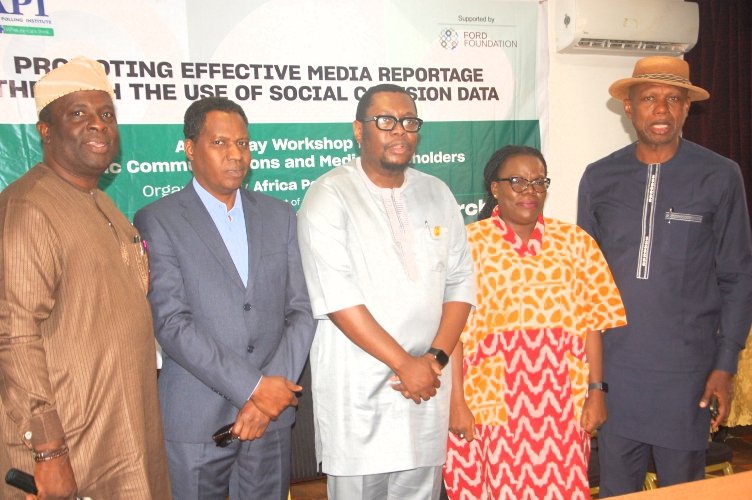By Perpetua Onuegbu
Media and communication experts have called on journalists to adopt development-oriented reporting that promotes social cohesion and supports national development efforts.
They made the call on Friday in Abuja at a capacity building workshop for public communication and media stakeholders, tagged “Promoting Effective Media Reportage through the Use of Social Cohesion Data”.
The workshop was organised by Africa Polling Institute (API), with support from the Ford Foundation.
Speaking on the topic “Reporting for Unity – Principles of Cohesion-Sensitive Journalism”, Dr Diego Okenyodo, Founder of Akweya TV, said communication lies at the heart of driving societal change.
He emphasised that achieving change is a shared responsibility and urged journalists to embrace systems thinking and the principles of development journalism in their reporting.
“Development journalism posits that the media should actively support efforts that improve citizens’ lives by focusing on issues of social, political, and economic development.
“In social cohesion reporting, journalists must avoid conflict-sensitive language and counter divisive narratives because of their potential impact on national unity,” Okenyodo said.
Dr Bell Ihua, Executive Director of API, said the workshop aimed to encourage journalists to use API’s research findings to inform their reporting and influence public discourse.
He noted that although API has conducted nationwide social cohesion surveys since 2019, many key stakeholders remain unaware of the data or lack the tools to use them meaningfully in shaping policy and programmes.
“That’s why we are engaging the media, to amplify these findings and ensure they’re included in policy planning and discourse,” Ihua said.
“Social science helps us examine societal challenges and propose solutions. But without data, we cannot make informed, data-driven policy decisions. Gone are the days of intuition-based governance”.
Ihua added that the 2025 edition of the Nigeria Social Cohesion Survey will be inaugurated on July 3.
Dr Soji Adeniyi, Executive Director of Africa Back to Basics and Vice Chair of API, said data should be used as a tool to counter negative stereotypes and support evidence-based narratives.
“It’s time we start telling our own stories, based on our own realities. The government and NGOs must begin using reliable, homegrown data to drive decisions,” he said.
“This data offers insight into what Nigerians are thinking and helps us match perceptions with realities to move the country forward”.
Also speaking, Dr Obiora Chukwumba, a seasoned media professional, urged journalists to stand with the people and tell stories that inspire inclusion and national unity.
In his session on storytelling and framing, he discussed practical techniques for crafting narratives that foster cohesion and discourage polarisation.
He advised media professionals to prioritise responsible journalism, warning that divisive reporting threatens national peace and development.
NAN





